| Srl | Item |
| 1 |
ID:
123671
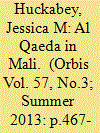

|
|
|
|
|
| Publication |
2013.
|
| Summary/Abstract |
The control of northern Mali in 2012 by Tuareg rebels and Islamist fighters aligned with al Qaeda proved a serious challenge to Western counterterrorism policies. This article looks at several aspects often overlooked in discussions of the internal dynamics of al Qaeda-linked groups. Using defections related to the al Qaeda in the Islamic Maghreb (AQIM) offshoot group, the Movement for Unity and Jihad in West Africa (MUJAO), in Mali as a case study, this article considers the issues of race and legitimacy connected to the group and the threat and policy implications that flow from this analysis.
|
|
|
|
|
|
|
|
|
|
|
|
|
|
|
|
| 2 |
ID:
123669
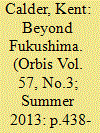

|
|
|
|
|
| Publication |
2013.
|
| Summary/Abstract |
This article considers the political-economic process by which "energy angst" created an embedded nuclear orientation in Japanese energy policymaking, and then how, following Fukushima, Japan initially tried to transform that structural tendency, through a political system poorly suited to reform, before edging back toward its traditional path. Due both to the prevailing systemic bias and the underlying political economy of nuclear power, the process of transformation promises to be a turbulent and extended one, with natural gas and energy efficiency being crucial tools for ameliorating the difficult realities of the domestic status quo.
|
|
|
|
|
|
|
|
|
|
|
|
|
|
|
|
| 3 |
ID:
123670
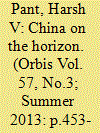

|
|
|
|
|
| Publication |
2013.
|
| Summary/Abstract |
While the world has been focusing on China's growing assertiveness in the South China Sea, Beijing and Delhi are also engaged in a quiet struggle in the contested waters. By putting up for international bidding the same oil block that India had obtained from Vietnam for exploration, China has thrown down a gauntlet.1 By deciding to stay put in the assigned block, India has indicated it's ready to take up the Chinese challenge. At stake is Chinese opposition to India's claim to be a regional power in the larger Asian strategic setting. India is trying to emerge as a credible regional balancer but it has a long way to go.
|
|
|
|
|
|
|
|
|
|
|
|
|
|
|
|
| 4 |
ID:
123665


|
|
|
|
|
| Publication |
2013.
|
| Summary/Abstract |
Are Americans becoming more "isolationist"? Four years ago, for the first time since the Vietnam War, almost half of those polled by the Pew Research Center stated they would rather the United States "mind [its] own business internationally and let other countries get along the best they can on their own" and work to "reduce military commitments overseas" in order to decrease the deficit. Such cautious views about American involvement abroad are on the rise, up ten percentage points over the past decade, according to Pew polls released in 2011 and 2012. A majority of Americans think the United States is withdrawing from Afghanistan too slowly and are reticent to take direct action in Syria. This article explains the long historical context of these recent events to argue for the enduring power and significance of isolationist thought.
|
|
|
|
|
|
|
|
|
|
|
|
|
|
|
|
| 5 |
ID:
123664
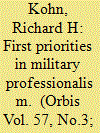

|
|
|
|
|
| Publication |
2013.
|
| Summary/Abstract |
This article contends that it is time for the armed forces to revisit their schools, day rooms, wardrooms, squadron meeting places, headquarters, bases and posts to increase the level of awareness and the teaching of professional norms.
|
|
|
|
|
|
|
|
|
|
|
|
|
|
|
|
| 6 |
ID:
123662
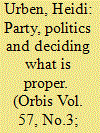

|
|
|
|
|
| Publication |
2013.
|
| Summary/Abstract |
Drawing on recent research, the author shows how a majority of officers still believe that the active duty military should not criticize civilian leaders publicly. However, fewer today think this way than those surveyed in the late-1990s. This is a surprising finding given the poisoned state of civil-military relations towards the end of the Clinton Administration, but perhaps is indicative of the Army's frustrated experiences in Iraq and Afghanistan over the past decade.
|
|
|
|
|
|
|
|
|
|
|
|
|
|
|
|
| 7 |
ID:
123663


|
|
|
|
|
| Publication |
2013.
|
| Summary/Abstract |
This article seeks to answer several vital questions about contemporary American civil- military relations. For example, why might the most professional military in United States history seem to be especially likely to engage in public dissent and advocacy? Why might political dissent and activity hold appeal for current and upcoming generations of military officers? And, how can present day officers be persuaded that retaining an apolitical ethos is fundamental to the American military, not just because of tradition but because public dissent can do real damage to the military institution and to the country it serves?
|
|
|
|
|
|
|
|
|
|
|
|
|
|
|
|
| 8 |
ID:
123667
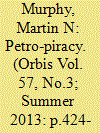

|
|
|
|
|
| Publication |
2013.
|
| Summary/Abstract |
West Africa piracy is the most profitable in the world. Well-organized gangs steal refined oil in contrast to Somali pirates who hold crews and ships for ransom. Like piracy elsewhere, the origins and potential solutions to West African piracy are found ashore-largely in Nigeria. This article argues that oil states in the developing world are shielded from the domestic and international pressures that can bring down their non-oil neighbors. The current international system which makes international recognition, not internal legitimacy or functionality, the key to state authority works to their benefit. It encourages those parts which are valuable to industrialized powers-and to the domestic elites who facilitate and benefit from international legitimization-to function well enough for resource extraction to continue. The security of the state generally matters less than the security of key enclaves- including ships and offshore platforms-which support elite interests.
|
|
|
|
|
|
|
|
|
|
|
|
|
|
|
|
| 9 |
ID:
123666


|
|
|
|
|
| Publication |
2013.
|
| Summary/Abstract |
Yemen, the poorest and most populous country on the Arabian Peninsula, has long been a prime candidate to join the failed state club. After the wave of uprisings sweeping through the Middle East reached the country in early 2011, the already high levels of instability and violence reached new heights and threatened to accelerate a steady march towards collapse. Even though a variety of scenarios can be identified for the future of Yemen, the most likely paths all imply a period of prolonged instability. This will carry significant consequences for regional and international security, in particular, by providing al Qaeda's local franchise with an attractive safe haven from which to plan and launch operations.
|
|
|
|
|
|
|
|
|
|
|
|
|
|
|
|